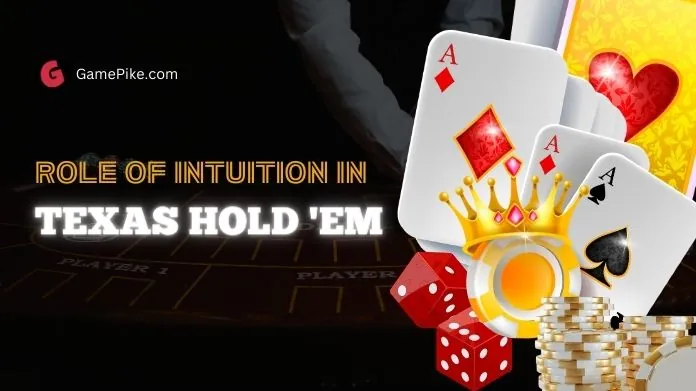Intuition in Texas Hold em plays a crucial role in decision-making. It’s not just about the visible cards or calculated odds
A player’s gut feeling about an opponent’s hand or their own can significantly influence their strategy.
This reliance on instinct, alongside analytical skills, adds a unique layer of complexity to the game.
Intuition may not always be quantifiable, but it often leads to unexpected yet successful outcomes, making Texas Hold ’em both intriguing and challenging.
Understanding Intuition in Texas Hold em.
 Intuition plays a pivotal role in Texas Hold em, a game where decisions must be made quickly with incomplete information.
Intuition plays a pivotal role in Texas Hold em, a game where decisions must be made quickly with incomplete information.
While mastering the game’s technical aspects is important, players frequently rely on their gut feelings to navigate complex scenarios.
Intuition in poker is the ability to make accurate judgments without conscious reasoning, often based on accumulated experience and the subtle reading of opponents’ behaviors and patterns.
The Balance Between Skill and Intuition
Texas Hold em is a blend of skill and chance. Skilled players understand the importance of probability, game theory, and strategy.
However, the unique aspect of poker is that it’s also a game of human psychology. This is where intuition comes into play.
A player’s ability to ‘read’ the game, understand the psychology of their opponents and anticipate moves is often based on intuition.
This instinctive understanding can be as critical as technical knowledge in vital game moments.
Developing Intuitive Skills in Poker
Developing intuition in poker isn’t about ignoring logic or mathematical strategies. Instead, it’s about enhancing your logical play with an intuitive understanding of the game.
This development comes from experience, observation, and learning to trust your gut feelings.
Intuition is honed through playing numerous hands, observing different playing styles, and reflecting on the game’s outcomes.
The Role of Intuition in Decision-Making
In Texas Hold em, decision-making is complex and multifaceted. Intuition plays a key role in decisions like bluffing, folding, or calling. These decisions often have to be made under pressure and with limited information.
A player’s intuition, developed through experience, can guide them in these situations, helping them to read the game beyond the visible cards and bets.
Examples of Intuitive Play in Texas Hold ’em.
Consider a situation where a player feels their opponent is bluffing despite having a weak hand.
This ‘gut feeling’ might lead them to call a bluff, a decision that may not seem logical based on the cards alone. When successful, intuitive plays can turn the tide of a game.
Intuition vs. Tilt in Poker

It’s important to differentiate between intuition and emotional reactions, often referred to as ’tilt’ in poker.
Tilt is when players make decisions based on emotions rather than logic or intuition. It often leads to poor judgment and loss of control over the game.
Cultivating intuition involves being aware of emotions but not letting them dominate decision-making processes.
Learning Resources
For those looking to enhance their understanding of Texas Hold ’em, exploring a comprehensive Texas Hold ’em guide can be beneficial.
Such resources provide insights into the game’s nuances, strategies, and the development of technical and intuitive skills.
The Impact of Experience on Intuitive Play
Experience is a key factor in enhancing intuition in Texas Hold ’em. Players who have spent considerable time at the table tend to develop an instinctual feel for the game.
This experience allows them to pick up on patterns and behaviors that less experienced players might need to catch up on.
It’s not just about the number of hands played but also about the diversity of situations a player has encountered. Experienced players often recall similar situations and outcomes that inform their current decision-making process.
This reservoir of knowledge, built over time, feeds into a player’s intuitive sense and can be a significant advantage in the game.
Advanced Strategies and Intuitive Decision Making
While basic strategies in Texas Hold ’em can be learned relatively quickly, advanced strategies require a deeper understanding and a blend of intuition and analytical skills.
For instance, hand ranges, pot odds, and player tendencies are critical aspects that players must consider.
However, the ability to go beyond these factors and make a decision that contradicts the obvious logical choice yet feels right is a mark of a skilled intuitive player.
It’s about understanding the subtleties of the game and the players and sometimes making decisions that are counterintuitive to conventional strategies but are informed by a deep, instinctual understanding of the game dynamics.
The Role of Observation in Developing Intuition
Observation is a critical skill in Texas Hold ’em and greatly contributes to developing intuition.
Paying attention to opponents’ betting patterns, physical tells, and even their use of time can provide valuable information that transcends the cards in play.
Skilled players often observe minute details that give away information about other players’ hands and strategies.
This ability to observe and process information subconsciously contributes to a player’s intuitive strength.
Players can develop a deeper intuitive understanding of how different scenarios might unfold by continuously observing and analyzing games, even when not directly involved in a hand.
Wrap Up!
In Texas Hold ’em, intuition is a vital aspect of the game, complementing technical skills and strategic knowledge. Players who successfully integrate intuition into their decision-making process often find themselves making better judgments, leading to improved game performance.
Developing this skill requires experience, observation, and a deep understanding of the game and human psychology.


